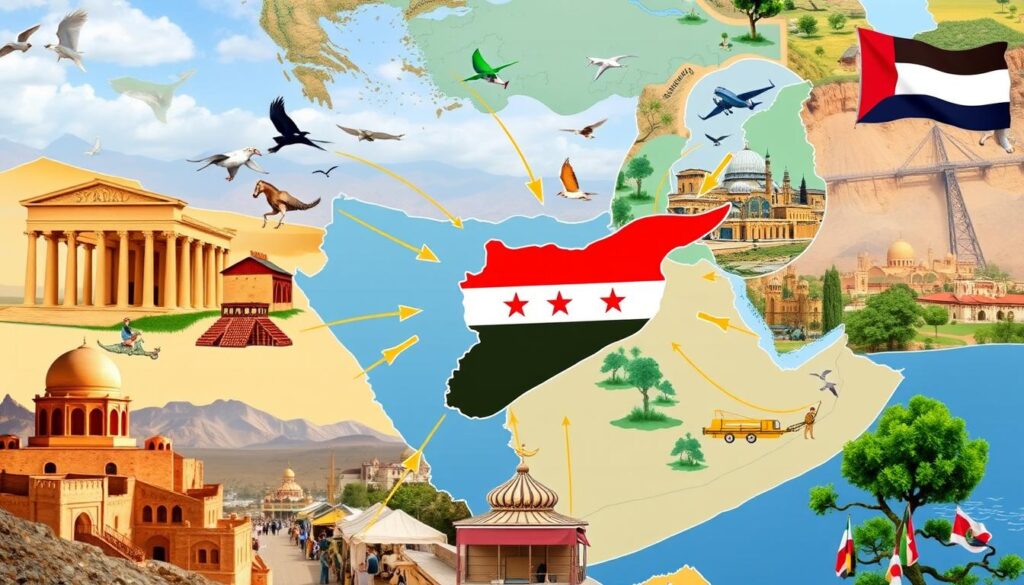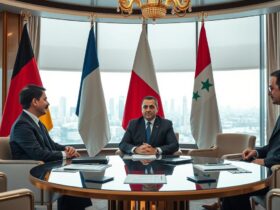Regional powers are now reaching out to Syria’s new leaders. This is a big step after years of war. They want to help rebuild and make the country stable again.
This change is very important for Middle Eastern politics. Countries are talking to Damascus about working together. They want to help in many areas, like business and keeping people safe.
This new effort in diplomacy is not just about Syria. It’s also about solving problems in the whole region. It’s a hopeful time for making new alliances and bringing peace to the area.
Key Takeaways
- Middle Eastern diplomacy is evolving with renewed engagement with Syria’s new leadership.
- Efforts focus on shifting Syrian government relations from conflict to cooperation.
- Potential regional cooperation with Syria includes economic investment and security initiatives.
- Key nations are proactively engaging with Damascus to stabilize and rebuild post-conflict Syria.
- These diplomatic moves could reshape regional dynamics and address broader regional concerns.
Historical Context of Syrian Relations
To understand Syria’s past with its Middle Eastern neighbors, we must look at its pre-war diplomacy. We also need to see how the Syrian Civil War changed things. Long-standing alliances and regional politics greatly influenced Syria’s foreign policy.
After the war started in 2011, its neighbors had to rethink their relations with Syria. This was due to the war’s impact on the region.
Pre-war Syrian diplomacy
Before the Syrian Civil War in 2011, Syria had strong alliances and rivalries. It was close to Iran, sharing interests and opposing Western influence. On the other hand, Syria’s ties with Saudi Arabia and Turkey were often tense.
This was because of different political views and regional goals.
Impact of Civil War on Middle East ties
The Syrian Civil War changed the region’s politics a lot. As fighting grew, old alliances were tested. This led to a mix of new friendships and diplomatic changes.
Neighboring countries had to weigh their humanitarian goals against their safety. This was a big challenge for them.
Initial Diplomacy Efforts with Syria’s New Leaders
The new Syrian leaders have changed the Middle East’s politics. Many countries want to connect again. They are watching how Syria’s new government starts talks.
First Interactions and Meetings
At first, leaders from different places met Syria’s new team. These talks were about working together again. They wanted to rebuild trust and plan for the future.
Many countries want to help. They say it’s important to be united and stable.
Statements from Middle Eastern Officials
Top officials are hopeful about working with Syria again. Leaders like President Recep Tayyip Erdogan and King Salman bin Abdulaziz are eager for peace. They want a stable Middle East, with Syria helping to make it happen.
Middle Eastern powers begin outreach to Syria’s new leaders
As Middle Eastern powers start talking to Syria’s new leaders, a careful plan is in action. This move shows how the region is changing. It’s a mix of old friendships and new partnerships, showing a fresh way of talking.
The Syrian government is making new friends in the area. Countries like Saudi Arabia, Iran, and Turkey are leading the way. They want to help Syria and gain influence in the region.
There are lots of talks and meetings to improve relations. Deals on money, security, and more are being made. This is all about getting Syria back into the regional mix.
“In these crucial times, it’s imperative for regional stability that we engage constructively with the new Syrian leadership,” stated a senior diplomat from Saudi Arabia.
Many in the region agree on the importance of this move. It’s a big step in modern diplomacy. As things move forward, we’ll see more partnerships and cooperation, changing how Syria is seen in the Middle East.
Key Middle Eastern Players in Syrian Dialogue
As Syria moves forward, key players have stepped up. Saudi Arabia, Iran, and Turkey are leading the way. They each have their own plans and views.
Role of Saudi Arabia
Saudi Arabia is playing a big part in Syria’s talks. They want to grow their power through talks and money. They aim to balance things out and keep peace in the area.
Involvement of Iran
Iran is close to Syria because of a strong bond. They help Syria with money and troops. Iran wants to keep its strong spot in the Middle East.
Turkey’s Position and Strategies
Turkey is using both guns and words to get ahead. They talk to many leaders to make their mark. Turkey wants to be heard and respected in the talks.
| Country | Role | Primary Interests |
|---|---|---|
| Saudi Arabia | Economic Engagement, Diplomatic Involvement | Countering Iran, Regional Stability |
| Iran | Military Support, Economic Aid | Maintaining Influence, Strategic Alliance with Syria |
| Turkey | Military Presence, Diplomatic Negotiations | Security Concerns, Regional Influence |
Major Topics Discussed in Middle East Foreign Policy Meetings
Recent meetings in the Middle East focused on many important topics. They mainly talked about rebuilding and stabilizing Syria. These talks are key to finding peace and helping the economy grow.
Economic cooperation and investment
Helping Syria’s economy is a big goal for Middle Eastern countries. They talked about investing in things like roads, hospitals, and schools. Saudi Arabia and the UAE want to lead these efforts to bring in more money.
- Reconstruction of key infrastructure: Countries are offering money to fix important services like water and electricity.
- Healthcare and education: They plan to work together to make health and education better. This includes building new places and fixing old ones.
- Commercial investments: They also talked about working with businesses. This could create jobs and help the local economy grow.
Security and anti-terrorism measures
Keeping the area safe was another big topic. A safe place is needed for Syria’s economy to get better. Countries talked about sharing secrets, improving borders, and stopping terrorists.
“Joint intelligence-sharing initiatives are fundamental to maintaining regional security and preventing extremist activities,” stated a key official during the Middle East foreign policy meetings.
| Country | Key Initiative | Expected Outcome |
|---|---|---|
| Saudi Arabia | Increased border security | Reduced illegal crossings and smuggling |
| UAE | Funding anti-terrorism training programs | Better-prepared local forces against terrorism |
| Turkey | Enhanced intelligence-sharing | Early warnings and prevention of terrorist plots |
These meetings show a big push for safety and economic growth in Syria. The plans they made are both quick fixes and long-term goals. They aim to make the area strong, working together, and prosperous.
Geopolitical Impact of Renewed Syrian Relations
The impact of renewed Syrian relations on the Middle East geopolitical dynamics is big. It changes the way power works in the region. Syria is making new friends and changing how countries work together.

Now, Syria is close to big countries like Saudi Arabia, Iran, and Turkey. This changes how they make plans and set goals. It makes them work together but also compete, changing the balance of power.
These new friendships help with money, safety, and making the Middle East stronger. Syria’s comeback is expected to bring more changes. It will lead to new stories and plans.
The next few years will show how Syria’s new friends help the region. They will help make the Middle East more stable and grow its economy. The alliances will shape the future of the Middle East.
Challenges and Potential Obstacles
Working with Syria’s new leaders is tough. Many problems come from outside and inside the country.
Opposition from Western countries
Western countries often say no to helping Syria. They worry about human rights and who gets power. This makes it hard to talk and work together with Syria’s new leaders.
Internal political resistance
There’s also trouble inside Syria and other Middle Eastern countries. Different groups and ideas can slow down talks. Old leaders might see new friends as a danger, making things even harder.
| Obstacle | Details | Impact |
|---|---|---|
| Western Opposition | Concerns about human rights and geopolitical influence | Barriers to dialogue and cooperation |
| Internal Political Resistance | Entrenched governmental structures and ideological differences | Hindering diplomatic progress |
Conclusion
The Middle East is changing fast, and Syria’s new leaders are a big part of this change. Countries like Saudi Arabia, Iran, and Turkey are playing big roles. They are working together to help Syria grow and be safe.
They talk about money and jobs, and how to fight terrorism. This is all part of making the Middle East better. It’s a big chance for peace and stability.
But, there are also challenges. Some Western countries don’t agree, and there are people in Syria who don’t want to change. Still, the chance for a better future is worth trying.
By working together, the Middle East can become a more united and strong place. This is a big step towards peace and happiness for everyone.
The move to connect with Syria’s new leaders is very important. It shows how much countries care about working together. They want to make the Middle East a better place for everyone.
What happens next will really matter. It will help decide the future of the Middle East. Let’s hope for the best.














Leave a Reply